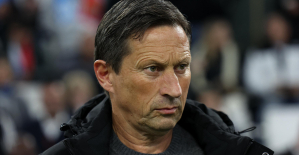Neutrality does not mean indifference. It's a phrase that has been used thousands of times over the past few months. And yet it is still difficult to grasp it in all its dimensions: since February 24, 2022, the war has been back in Europe. Russia invaded Ukraine. Putin's war of aggression against a sovereign and independent neighboring country, which violates international law, has caused enormous destruction and unbelievable suffering. The shocking images from Bucha, Irpin or Mariupol have burned themselves deep into our collective memory. In the Europe of the 21st century, none of us would have thought such brutal crimes possible.
These images mark a drastic turning point: the war in Ukraine not only represents a turning point in history, it also represents a break in civilization. No one can turn a blind eye to such harrowing atrocities. We in Europe, in particular, wanted to believe for too long that Francis Fukuyama was right with his theory about the “end of history” and that liberal western-style democracy would prevail worldwide.
At the latest since the early morning hours of February 24, our “holiday from history” is over. The decades-long peace dividend for us Europeans has expired, hard realpolitik has returned – in Europe, but also elsewhere. Because the war in Europe is not a European war. Nor is it a war of East versus West, North versus South.
It is ultimately about the global validity of a rule-based order. It is a clash between the rule of law and the law of the jungle, between the rule of law over the law of the strongest. For me it is completely clear on which side Austria has to stand.
In the past few months there have been repeated calls for Austria to give up its neutrality in this war of aggression. This criticism is based on a fatal misunderstanding: neutrality never means indifference, non-alignment is not a synonym for freedom from values. There is a good reason why the 1955 Neutrality Act makes no mention of "neutrality".
Our neutrality is military - it is not only compatible with Austria's active role in foreign policy, but actually requires such a role. On the other hand, an appeasement in the name of a misunderstood neutrality towards Russia's military aggression would be a betrayal of the fundamental values on which our republic is built.
Austria has positioned itself clearly in recent months. Despite profound economic interests in the region, Austria supports all eight EU sanctions packages and stands by Ukraine in solidarity: More than 80,000 displaced persons have found refuge, more than 80 million euros in humanitarian aid have been provided and around 1000 tons of relief supplies have been delivered.
And last but not least, Vienna is the host of the UN commission of inquiry into Ukraine, which a few days ago officially confirmed war crimes in Bucha and other Ukrainian locations. In light of our political neutrality limits, Austria has not participated in deliveries of lethal weapons and – like Malta and Ireland – compensated for this with higher contributions to civilian support.
So far, despite all the prophecies of doom, the European Union has shown its will and ability to act. Member States are united against Russian aggression. The full effect of the sanctions is unfolding step by step. But, to paraphrase Bertolt Brecht: "The toils of the plains lie ahead." The war in Ukraine will not end any time soon, its global effects will be felt for a long time.
Europe must remain united and keep its nerves of steel. High inflation and the energy crisis are already weighing on us, and many are anxious about the coming winter. The Austrian government is taking strong countermeasures and has decided on anti-inflation packages worth 33 billion euros to relieve citizens and companies.
Even if the Russian propaganda machine repeats it like a mantra: the sanctions are not the cause of the current crisis. A cynical attempt is made here to reverse cause and effect. It's only Putin's attack. And he has it in his hands to end this war.
That some in Europe take the opposite view is their right. Our pluralistic society is based on freedom and individual rights. We are crisis-proof not despite, but because of our different opinions and political debates. Opposition, free media and civil society are the drivers of innovation and transformation. It is they, not bombs and rockets, that advance and strengthen our society: democracies are capable of learning, autocratic systems are not.
Alexander Schallenberg, 53, is Foreign Minister of the Republic of Austria. The lawyer has worked in a wide variety of positions at the Foreign Ministry since 1997, becoming its head for the first time in 2013. When the then Federal Chancellor Sebastian Kurz resigned in October 2021, he appointed Schallenberg as his successor. After almost two months he returned to his post as foreign minister.

 Sydney: Assyrian bishop stabbed, conservative TikToker outspoken on Islam
Sydney: Assyrian bishop stabbed, conservative TikToker outspoken on Islam Torrential rains in Dubai: “The event is so intense that we cannot find analogues in our databases”
Torrential rains in Dubai: “The event is so intense that we cannot find analogues in our databases” Rishi Sunak wants a tobacco-free UK
Rishi Sunak wants a tobacco-free UK In Africa, the number of millionaires will boom over the next ten years
In Africa, the number of millionaires will boom over the next ten years Can relaxation, sophrology and meditation help with insomnia?
Can relaxation, sophrology and meditation help with insomnia? WHO concerned about spread of H5N1 avian flu to new species, including humans
WHO concerned about spread of H5N1 avian flu to new species, including humans New generation mosquito nets prove much more effective against malaria
New generation mosquito nets prove much more effective against malaria Covid-19: everything you need to know about the new vaccination campaign which is starting
Covid-19: everything you need to know about the new vaccination campaign which is starting For the Olympics, SNCF is developing an instant translation application
For the Olympics, SNCF is developing an instant translation application La Poste deploys mobile post office trucks in 5 rural departments
La Poste deploys mobile post office trucks in 5 rural departments Meta accelerates into generative artificial intelligence with Llama 3
Meta accelerates into generative artificial intelligence with Llama 3 In China, Apple forced to withdraw WhatsApp and Threads applications at the request of the authorities
In China, Apple forced to withdraw WhatsApp and Threads applications at the request of the authorities The main facade of the old Copenhagen Stock Exchange collapsed, two days after the fire started
The main facade of the old Copenhagen Stock Exchange collapsed, two days after the fire started Alain Delon decorated by Ukraine for his support in the conflict against Russia
Alain Delon decorated by Ukraine for his support in the conflict against Russia Who’s Who launches the first edition of its literary prize
Who’s Who launches the first edition of its literary prize Sylvain Amic appointed to the Musée d’Orsay to replace Christophe Leribault
Sylvain Amic appointed to the Musée d’Orsay to replace Christophe Leribault Skoda Kodiaq 2024: a 'beast' plug-in hybrid SUV
Skoda Kodiaq 2024: a 'beast' plug-in hybrid SUV Tesla launches a new Model Y with 600 km of autonomy at a "more accessible price"
Tesla launches a new Model Y with 600 km of autonomy at a "more accessible price" The 10 best-selling cars in March 2024 in Spain: sales fall due to Easter
The 10 best-selling cars in March 2024 in Spain: sales fall due to Easter A private jet company buys more than 100 flying cars
A private jet company buys more than 100 flying cars This is how housing prices have changed in Spain in the last decade
This is how housing prices have changed in Spain in the last decade The home mortgage firm drops 10% in January and interest soars to 3.46%
The home mortgage firm drops 10% in January and interest soars to 3.46% The jewel of the Rocío de Nagüeles urbanization: a dream villa in Marbella
The jewel of the Rocío de Nagüeles urbanization: a dream villa in Marbella Rental prices grow by 7.3% in February: where does it go up and where does it go down?
Rental prices grow by 7.3% in February: where does it go up and where does it go down? With the promise of a “real burst of authority”, Gabriel Attal provokes the ire of the opposition
With the promise of a “real burst of authority”, Gabriel Attal provokes the ire of the opposition Europeans: the schedule of debates to follow between now and June 9
Europeans: the schedule of debates to follow between now and June 9 Europeans: “In France, there is a left and there is a right,” assures Bellamy
Europeans: “In France, there is a left and there is a right,” assures Bellamy During the night of the economy, the right points out the budgetary flaws of the macronie
During the night of the economy, the right points out the budgetary flaws of the macronie These French cities that will boycott the World Cup in Qatar
These French cities that will boycott the World Cup in Qatar Europa League: “We dream of everything,” says Jean-Louis Gasset
Europa League: “We dream of everything,” says Jean-Louis Gasset Europa League: “Trouble playing our football,” admits Benfica coach
Europa League: “Trouble playing our football,” admits Benfica coach Europa League Conference: “Martinez eats all your deaths”, Obraniak’s breakdown after the elimination of Lille
Europa League Conference: “Martinez eats all your deaths”, Obraniak’s breakdown after the elimination of Lille Premier League: “It’s a team that is transforming into the Champions League”, Casemiro returned to Real’s qualification
Premier League: “It’s a team that is transforming into the Champions League”, Casemiro returned to Real’s qualification


















